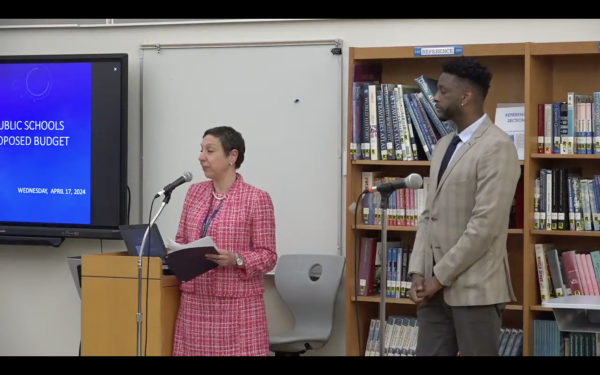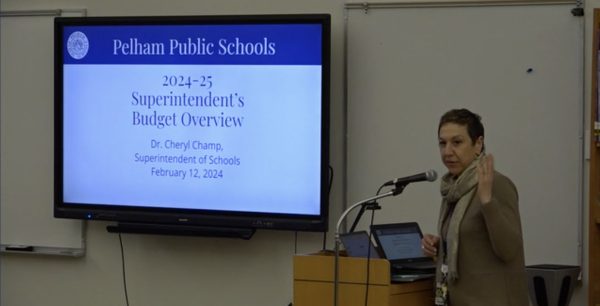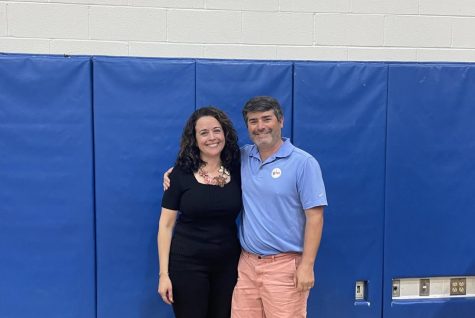Rowe misunderstands approach and goals of racial equity audit; his fears misplaced
To the editor:
As an educator, I have some concerns with how Ian Rowe characterized the equity audit in his recent interview with the Pelham Examiner. In my coursework at Teachers College, I read a fair number of studies that mirror the approach and methodology employed by the Metro Center and what their recommendations are. More importantly, the qualitative data that was collected by way of feedback from students is critical information that deserves a thoughtful, reasoned response from our community, and the report provides guidance to support that process.
Rowe stated that, “One of the many flaws of the equity audit is that the Metro Center provided amorphous and un-actionable next steps.” I found this concern to represent a fundamental misunderstanding of the goals and underlying philosophical frameworks contained in the audit. While the audit does include actionable steps in the conclusion, these steps place the onus on the district and the community to push the work forward. They call for a generative process that includes participation from across the community, including an emphasis on student voice. In other words, the very point is for us to take steps that make sense for our community, rather than for the Metro Center to direct our actions.
Rowe also supposes that the equity audit is intended to promote curriculum changes that “make stereotypical group assumptions about (students) being ‘privileged’ or being ‘marginalized’” or otherwise “categorize” students. This fear is misplaced because equity-building curriculum does not do this at all; it is designed to be learner-centered, participatory and affirming for all. It seeks to move away from labels because they are reductionist and the world is a complicated and dynamic place. It pushes a shift toward learning how to see every person as an individual, including the challenges that they may face given their lived experiences. Creating this space to empathize with others’ experiences and making changes at a policy level to abolish structural racism are at the heart of creating a more equitable society. Rowe’s concerns are actually touched upon in the audit’s recommendations, especially if you are familiar with the texts that they are citing. We all need this education to be equipped to function in a diverse community.
Because of the generative process called for in the audit, the interventions that will be designed and implemented to address inequity in our school system will come from the people of Pelham. This is our opportunity to listen and learn from each other, allowing us to better understand ourselves, our neighbors and the dynamics within our own community. To ground ourselves in research and texts—not anecdotal practices from other places—and then model that process for our children. Finally, once we’re all speaking the same language, we need to work together to identify the inequities in this community and find the best ways to break them down. These are the actionable steps that are called for in the audit. No one else can do that heavy lifting for us, though, and we need to do this work now.
Elizabeth Herbert-Wasson
17 Irving Place







Maryanne Joyce • May 7, 2021 at 9:22 pm
The Princeton Plan is a red herring. Everyone in town knows it’s never going to happen. Pelhamites are too fond of our neighborhood schools. Not surprising that it was mentioned in the equity audit because the idea has been around forever, but it is swatted down every time it comes up. It will not make it out of the gate this time either. Don’t base your vote on something that is never going to happen. Don’t believe the hype, or the attempt to make it central to this campaign. That said, I would make several points.
1) Re neighborhood schools: One aspect folks claim to like is that kids can walk to school. Why then are there vehicular traffic jams outside every elementary school for drop-off and pick-up? Parents or babysitters drive kids to schools because it’s raining, or it’s late, or it’s “too far” to walk, or because it’s convenient because they are on their way to work anyway. Help the environment. Help your kids leave the house early enough to walk (or bike) to school. Why else do we pay crossing guards?
2) Mixing and mingling: I grew up in a small town that was/is 19 square miles, and that was roughly the population size of Pelham (which, according to Wikipedia is only 2.2 square miles!), with a graduating class of about 200 students. (And, surprise! Only one government, one police station, one fire station, but that’s a different conversation.) Schools were grouped by grade, not by neighborhood. By the end of third grade, everyone knew everyone else by sight if not by name. No one viewed a kid from the other end of town as a stranger. We didn’t have a lot of racial diversity, but we did have a fair amount of economic diversity, of which I think we were all blissfully unaware, at least in elementary school. Many of us still walked to school, for me it was at least a mile there and back, in both first and second grade. (Many a day I skinned my knee running because I was late and back then girls weren’t allowed to wear pants.)
3) Unspoken agenda: This may change now that the Hutchinson School District has a brand new school. But for years any time there was any suggestion to redraw district lines to reduce overcrowding, Colonial parents would be up in arms at the idea that their kids might be re-zoned to Hutch. I don’t think we can/should ignore that there was an undercurrent of racism and classism in these protestations, even if no one ever said it out loud. As Pelham students and many parents have been telling us, loudly, since last Spring, these issues can no longer be swept under the rug and must be faced head on.
I urge folks not to base their vote for school board based on a red herring that will never come to fruition. Vote based on the educational philosophy and policies you want guiding our schools. Vote based on who has shown the most dedication and put in the most uncompensated time to date working with our children, other parents, school staff, and board, to address real pressing issues, and to improve our schools, our children’s lives, and our community. Vote for Janice Powers, Eileen Miller, or Jess Young.
Ferdinand Spucci • May 4, 2021 at 9:46 pm
I can’t believe that the district wasted good money on this study. What we need is not empathy so much as discipline and excellence in the fundamentals. In this age of snowflakes, our children need to understand that it is they who will need to adapt to society, the workforce, and the world as it is, not as a pipe dream.
It’s time for the adults to start acting like adults
Eileen Miller • May 4, 2021 at 7:10 pm
Thank you to everyone for your thoughtful commentary.
To clarify one point that Ian Rowe states in his comment, “decision making power” was never in the hands of NYU Metro Center. It was always with the District and, when appropriate, the Board. Nothing has been “taken away” because it was never there. The recommendations were always just recommendations – the Audit is one step in the larger goal of Cultural Competence as set out in the Strategic Plan. It is not the practice of the District or the Board to put “decision making power” in the hands of any outside organization, as I’m sure anyone in a public or private position would understand.
Melissa T Labonte • May 4, 2021 at 5:49 pm
As a fellow educator, I so appreciate your perspectives on this issue, Ms. Herbert-Wasson,
You make persuasive claims and put the emphasis rightly back on our district’s agency and responsibility concerning the work of Cultural Competence alongside equity advancement – in furtherance of inspiring a standard of excellence in all students.
Our obligations to advance this work are necessary given the qualitative and quantitative evidence we have compiled. As you note, students “need this education to be equipped to function in a diverse community.”
Our obligations are also legal.
BOE candidate, Janice Powers, stressed in her statement following last night’s Middle School/High School PTA meeting, to presume that we can “delay or dismiss these parts of our adopted Strategic Plan fails to uphold our legal obligations as a district to provide equal educational opportunities free of discrimination in all its forms. This point seems to be missing from our dialogue surrounding equity in our schools. To be clear, my candidacy is laser focused on rolling up my sleeves to engage in this hard but necessary work to make our community a better place for all students and families.”
As an Assistant Attorney General with unique expertise that the BOE would greatly benefit from in this important strategic planning area, it’s not a surprise that she would point this out where other candidates have failed to see it.
Ian V. Rowe • May 4, 2021 at 4:38 pm
Dear Ms. Herbert-Wasson,
Thank you for your reflections, especially from someone with a background in education. As the only candidate for the Pelham Board of Education with 10 years of actually running a network of schools, I think it is important that this type of expertise be represented on the Board, which is wholly missing currently.
As I shared in my presentation to the joint PMS/PMHS PTA last night, the motivations of the district in commissioning an Equity Audit were commendable and necessary, especially given student feedback of their lived experience.
When done well, these types of audits can be very helpful for a school district to learn about challenges that may exist with its culture or disparities or curriculum. But when I read the report produced by the NYU Metro Center, it was clear to me that the research was based on a flawed methodology and predetermined conclusions. It used small sample sizes, it contained amorphous recommendations, and it deliberately manipulated the presentation of data which in my view perpetuated negative racial stereotypes.
I encourage you and others to review the thorough critique I produced to be transparent about my concerns and to demonstrate a standard against which the board should expect for commissioned work. Here is a link: (https://pelhamexaminer.com/31398/letters-to-the-editor/outlines-areas-of-concern-with-divisive-conclusions-in-pelham-school-districts-racial-equity-audit/)
Frankly, I was stunned that no one on Pelham’s Board identified the glaring flaws. Thankfully, the Board has since said that it has taken decision-making power away from the NYU Metro Center. In my view, the Metro Center’s performance has not warranted continuing to work with them. I am very familiar with highly respected organizations that engage in what you rightfully describe as “the generative process that includes participation from across the community.” However, the organizations I would want to compete for the honor to work with Pelham ground their anti-racism and DEI work in a common humanity, rather than artificially labelling people and clumping wholly different individuals into stereotypical groupings.
As far as the Equity Audit’s concrete recommendations, there is one that was clearly made, and that is for the district to implement the Princeton Plan. I strongly oppose the Princeton Plan. While the current Board President says the Princeton Plan is not on the Board agenda at this time, the Pelham Examiner reported that at least one candidate for School Board has endorsed the Princeton Plan. That is a step that would destroy our neighborhood elementary school system, and fundamentally harm the overall quality of life in Pelham.
Overall, I am excited to build upon the important work of the Pelham strategic plan to diversify our curriculum and faculty. I also think it is absolutely essential to include student voices and feedback in our path forward towards a more inclusive Pelham. But I want to do it in a way that brings us together and does not create division, as NYU Metro Center’s approach suggests it would.
The beauty of public dialogue is that we can have reasoned discourse on important issues. That is the behavior I have modelled during this campaign, and how I would conduct myself if elected as a Trustee.
To all Pelham residents: If you agree with my approach, please vote for me on May 18. I commit to ensuring our district continues to achieve the mission to inspire a standard of excellence for all students.
With gratitude,
Ian Rowe